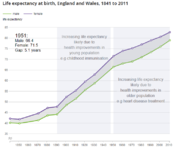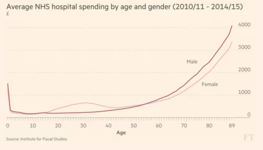I can't accept that, much as I would like to believe it.
To a large extent, the NHS is a victim of its own success.
The first graph shows increasing life expectancy (Source: ONS). Clearly life expectency was increasing prior to 1945, but does anyone believe this trajectory would have continued as far as it did without the NHS?
The second graph is spending by age, which shows a sharp increase in spending over the age of 65.
A successful NHS makes people live longer, which in turn, increases the demands upon it.
So where am I going with this? Not, I assure you, towards a "let them die" position. I worked in the NHS for over a decade, and both of my parents are reaching their latter years. As a professional and a human, I can't support that conclusion.
More recent studies suggest life expectancy is plateauing: maybe 80 or so years is the most we can sustain in any circumstances, so I don't necessarily assume this viscous cycle continues.
I would consider increasing retirement age: retirement age was about the same in life expectancy in 1950, so are we really entitled to expect 15-20 years out of employment at the end of our lives? However, I have no idea how reduced pensions/increased tax revenue could compare to the funds needed by the NHS.
View attachment 50837
View attachment 50838


